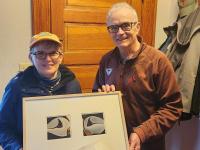Maine is ‘behind and laughably small.’ Good. Let's keep it that way
Katie Brown's May 17 article on the carbon footprint of industrial aquaculture in Maine states that Nordic Aquafarms, along with two other industrial aquaculture projects, has received "final or draft permits."
This is at best incomplete. Nordic has received permits from the Maine Department of Environmental Protection and the Belfast Planning Board, but both those permits are being appealed, and Nordic has yet to receive a needed Army Corps of Engineers permit.
The article further states that the three projects "would collectively discharge 47.3 million gallons of water per day." But Nordic's discharge of 7.7 million gallons a day would be effluent, not water, and it would contain no less than 1,600 pounds of nitrogen and 100 pounds of phosphorous - hardly the harmless-sounding "water" cited in the article.
The article fails to mention any of the myriad carbon problems linked to Nordic's project. In addition to daily dumping 7.7 million gallons of warm effluent into Penobscot Bay —and the Gulf of Maine, the fastest-warming marine waters in the world — Nordic would also destroy 56 acres of wetlands and carbon-sequestering mature forest.
Nordic would also dig up and truck off thousands of truckloads of carbon-sequestering soil and run massive, carbon-spewing diesel generators. And Nordic would use vast amounts of fishmeal made largely of soybeans from Brazil, where wide swaths of the carbon-sequestering Amazon rainforest are being destroyed to grow soy for grossly inefficient protein producers like Nordic.
Finally, the article quotes Sebastian Belle, executive director of the Maine Aquaculture Association, saying that Maine "is behind” and "we are laughably small." Good. Let's keep it that way. The less we have of this carbon-spewing industry, the better off we'll all be.
Lawrence Reichard lives in Belfast
Event Date
Address
United States





















